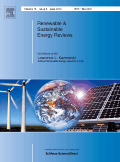
RENEWABLE & SUSTAINABLE ENERGY REVIEWS
Scope & Guideline
Connecting Academia with Practical Energy Solutions
Introduction
Aims and Scopes
- Renewable Energy Technologies:
The journal covers various renewable energy technologies, including solar, wind, hydro, and bioenergy, emphasizing advancements in their efficiency, scalability, and sustainability. - Energy Storage Solutions:
Research on energy storage systems, such as batteries and thermal energy storage, is a critical focus, exploring their role in enhancing the reliability and integration of renewable energy into the grid. - Policy and Economic Analysis:
The journal provides insights into the policy frameworks and economic models that support the transition to renewable energy, including analyses of market dynamics, subsidies, and regulatory impacts. - Environmental Impact Assessments:
Research published in the journal often includes comprehensive evaluations of the environmental impacts of renewable energy technologies, including life cycle assessments and sustainability analyses. - Innovative Systems and Integration:
The journal emphasizes innovative approaches to integrate renewable energy systems with existing infrastructures, including smart grids, microgrids, and demand-side management strategies. - Socioeconomic Factors and Community Engagement:
The journal addresses the social dimensions of renewable energy adoption, including community acceptance, equity, and the role of local stakeholders in the energy transition.
Trending and Emerging
- Energy Transition Pathways:
There is a growing focus on comprehensive frameworks and models that outline the transition pathways to a low-carbon economy, including multi-sector approaches and integrated energy systems. - Advanced Energy Storage Technologies:
Research on innovative energy storage technologies, such as solid-state batteries, flow batteries, and novel thermal storage solutions, is gaining traction as essential for balancing renewable energy supply and demand. - Hydrogen Economy:
The exploration of hydrogen production, storage, and utilization as a key component of the energy transition is rapidly trending, particularly in relation to green hydrogen and its role in decarbonizing various sectors. - Digitalization and Smart Technologies:
The integration of AI, IoT, and big data analytics into energy systems management and optimization is increasingly prominent, providing innovative solutions for enhancing energy efficiency and system resilience. - Circular Economy Approaches:
Research that aligns renewable energy development with circular economy principles is emerging, focusing on resource efficiency, waste reduction, and sustainable materials management. - Community Energy Initiatives:
There is a noticeable increase in studies focusing on local energy communities, participatory governance, and the social aspects of energy transition, reflecting a shift towards more inclusive energy systems.
Declining or Waning
- Conventional Energy Systems:
Research related to traditional fossil fuel systems is increasingly being overshadowed by a focus on renewable alternatives, leading to a decline in publications addressing conventional energy generation. - Basic Renewable Energy Technologies:
Fundamental studies on established renewable technologies (e.g., basic solar PV and wind energy) have decreased as the field matures, with more emphasis now placed on emerging technologies and innovative applications. - Single-Focus Case Studies:
There has been a noticeable reduction in the publication of single-focus case studies that do not integrate broader systems or comparative analyses, as the journal seeks to promote more holistic and multi-dimensional research. - Niche Renewable Technologies:
Research on niche or less commercially viable renewable technologies has waned, as funding and interest shift towards more promising and economically viable options.
Similar Journals
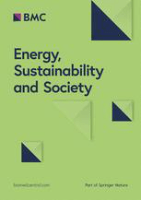
Energy Sustainability and Society
Fostering collaboration for a greener, more sustainable world.Energy Sustainability and Society is a leading open-access journal published by BMC, focusing on the critical intersections of energy sustainability and societal impacts. With an impressive Impact Factor and notable rankings—including Q1 in both Development and Energy Engineering, as well as Q2 in Renewable Energy, Sustainability, and the Environment—this journal serves as a pivotal platform for researchers, professionals, and students exploring innovative solutions to energy challenges. Since its inception in 2011, the journal has consistently provided high-quality research and insights, contributing significantly to the fields of energy policy, renewable technologies, and sustainable development. Access options are fully open-access, ensuring that research is freely available to foster collaboration and knowledge-sharing across disciplines. The journal’s commitment to publishing cutting-edge research underscores its importance in shaping a sustainable energy future.

Frontiers in Energy
Igniting Innovation in Energy Engineering and Power Technology.Frontiers in Energy is a distinguished journal published by HIGHER EDUCATION PRESS, focusing on the dynamic and rapidly evolving field of energy engineering and power technology. Established in 2011, the journal serves as a pivotal platform for disseminating innovative research findings and practical applications that address critical challenges in energy systems. With an impressive Q2 ranking in 2023 and a Scopus rank of 81 out of 272 in the discipline, it highlights the journal's influential impact within the academic community, reflecting its commitment to high-quality research. Based in Beijing, China, the journal aims to promote open and accessible scientific discussion, facilitating collaboration among researchers, professionals, and students alike. As an open access publication, Frontiers in Energy ensures that valuable knowledge is readily available to a global audience, effectively contributing to advancements in sustainable energy solutions. Join the forefront of energy innovation by engaging with cutting-edge research that shapes our energy future.
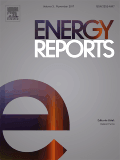
Energy Reports
Pioneering Open Access for Groundbreaking Energy DiscoveriesEnergy Reports, published by Elsevier, is a prestigious open access journal that serves as a vital resource in the field of energy research. Since its inception in 2015, this journal has swiftly ascended to become a key player in disseminating knowledge across various energy-related disciplines, evident from its impressive Q2 ranking in the miscellaneous category of Energy for 2023 and its notable position in the 78th percentile among over 70 journals in the general energy category, ranked 16th out of 73 on Scopus. Based in the United Kingdom, Energy Reports not only fosters innovative research but also promotes accessibility by providing open access to its articles, thereby ensuring that findings reach a global audience of researchers, professionals, and students. With a commitment to advancing sustainable energy solutions and technologies, Energy Reports plays a crucial role in shaping future energy policies and practices, making it an essential platform for scholarly communication in the ever-evolving landscape of energy research.

Global Energy Interconnection-China
Fostering Collaborative Insights in Renewable EnergyGlobal Energy Interconnection-China is an esteemed Open Access journal published by KEAI PUBLISHING LTD that focuses on the rapidly evolving fields of energy engineering and power technology. Since its launch in 2018, the journal has become a vital resource for researchers and professionals interested in sustainable energy solutions and innovative technologies, addressing the critical challenges facing the global energy landscape. With an impressive Q2 categorization in multiple engineering and energy-related disciplines, the journal ranks highly in Scopus, positioning itself as a leading platform for disseminating impactful research. Specifically, it excels in Automotive Engineering and Control and Systems Engineering, as evidenced by its competitive standing within the top quantiles of its fields. By leveraging its open access model, Global Energy Interconnection-China ensures that high-quality research is accessible to a worldwide audience, fostering collaboration and advancements in renewable energy, sustainability, and environmental conservation. For researchers, professionals, and students alike, this journal serves as a pivotal forum for sharing insights and innovations that shape the future of energy interconnection.

MRS Energy & Sustainability
Empowering Research in Energy and SustainabilityMRS Energy & Sustainability is a premier interdisciplinary journal published by SpringerNature, focusing on advancing the understanding of energy systems and sustainability within the context of materials science and engineering. Since its inception in 2014, this journal has rapidly gained recognition in the academic landscape, achieving impressive rankings including Q1 in Electronic, Optical and Magnetic Materials and Mechanics of Materials, and Q2 in Energy Engineering and Power Technology as well as Renewable Energy, Sustainability and the Environment, as of 2023. The journal's ISSN is 2329-2229 and E-ISSN is 2329-2237. With a commitment to open access, it provides researchers and professionals with the latest findings and insights essential for guiding innovations in energy solutions and sustainable practices. The journal's global reach and high-impact reputation make it an invaluable resource for scientists, engineers, and policymakers dedicated to addressing the contemporary challenges of energy and sustainability. With a diverse scope and high Scopus rankings, MRS Energy & Sustainability continues to be at the forefront of research that shapes our energy future.
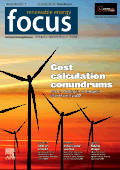
Renewable Energy Focus
Transforming Energy Challenges into Sustainable OpportunitiesRenewable Energy Focus is a premier journal published by Elsevier, dedicated to advancing the field of renewable energy and sustainability. With an ISSN of 1755-0084 and an E-ISSN of 1878-0229, this journal serves as a vital platform for researchers, professionals, and students interested in innovative solutions to energy challenges. Established in 2007, the journal has evolved to become a recognized authority in the subject area, currently ranked in the Q2 quartile of its category for 2023, emphasizing its significance in promoting impactful research. The journal encompasses a wide range of topics, including solar, wind, bioenergy, and sustainable practices that contribute to environmental conservation and energy efficiency. As part of Elsevier's commitment to disseminating high-quality research, Renewable Energy Focus is indexed in Scopus, currently holding a rank of #92/270 in the energy sector, positioning it in the 66th percentile of its field. This journal offers an essential resource for those dedicated to fostering sustainable energy solutions.

Frontiers in Energy Research
Illuminating the future of energy research.Frontiers in Energy Research is a prestigious open-access journal published by FRONTIERS MEDIA SA, dedicated to advancing knowledge in the diverse fields of energy research. Launched in 2013, the journal has established itself as a pivotal platform for disseminating high-quality research, particularly in areas such as Economics and Econometrics, Energy Engineering and Power Technology, and Renewable Energy, Sustainability and the Environment. With a notable impact factor and impressive quartile rankings, including Q2 in multiple categories and a reputation for rigorous peer review, Frontiers in Energy Research offers researchers, professionals, and students alike a vital resource for exploring the latest innovations and insights in energy studies. Operating from its base in Lausanne, Switzerland, this journal is committed to enhancing open accessibility to relevant research, significantly contributing to the global dialogue on energy solutions and sustainability.

Progress in Energy
Advancing Energy Innovation for a Sustainable FutureProgress in Energy, published by IOP Publishing Ltd, is an esteemed open-access journal that focuses on cutting-edge research in the field of energy. With its e-ISSN 2516-1083, this journal stands out for its commitment to disseminating high-quality articles that aim to advance the understanding and application of energy technologies and policies. Juggling respectably in the academic arena, it proudly holds a Q1 classification in the energy (miscellaneous) category and ranks 6th out of 73 in the general energy sector, placing it in the top 92nd percentile among its peers, according to Scopus metrics. The journal's scope encompasses a wide range of topics, including renewable energy, energy efficiency, and policy analysis, making it a vital resource for researchers, industry professionals, and students alike. With a publication horizon extending from 2019 to 2024, Progress in Energy invites contributions that push the boundaries of knowledge in energy fundamentals and innovations.

Journal of the Japan Institute of Energy
Exploring the Frontiers of Energy Technology.Journal of the Japan Institute of Energy, ISSN 0916-8753, is a reputable academic journal dedicated to the field of energy studies, reflecting the dynamic and evolving landscape of energy research. Published by the Japan Institute of Energy, the journal serves as a platform for disseminating innovative research, technologies, and methodologies related to energy engineering, renewable energy sources, and sustainability practices. While this journal does not currently offer open access, it remains a vital resource for professionals, researchers, and students alike, particularly those focused on advancing knowledge within Energy Engineering and Power Technology, Fuel Technology, and related areas. As of 2023, it is ranked in the Q4 quartile across several categories in Scopus, which highlights its foundational role in fostering scholarly discourse, despite its lower ranking in the competitive global landscape. Established in 1990 and continuously evolving, the journal provides insights into the challenges and innovations in the energy sector, making it an essential read for anyone invested in the future of energy solutions.
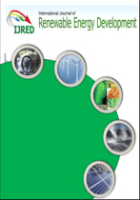
International Journal of Renewable Energy Development-IJRED
Shaping the Energy Landscape through Collaborative ScholarshipThe International Journal of Renewable Energy Development (IJRED), published by DIPONEGORO University in Indonesia, serves as a pivotal platform for scholarly research in the dynamic fields of renewable energy and sustainability. With a dedication to advancing knowledge since its inception in 2012, IJRED has embraced an Open Access model, ensuring that vital research is freely accessible to a global audience. The journal's impressive impact factor and its classification in the Q2 and Q3 quartiles across multiple categories—including Energy Engineering and Power Technology, Environmental Engineering, and Renewable Energy, Sustainability and the Environment—underscore its significance and authority in contemporary energy discourse. Indexed in Scopus, the journal consistently ranks among the top-tier publications, making it an essential resource for researchers, professionals, and students committed to innovating sustainable solutions in the face of climate challenges. Researchers are invited to contribute to this essential body of work as the journal continues to converge impactful research until 2024.